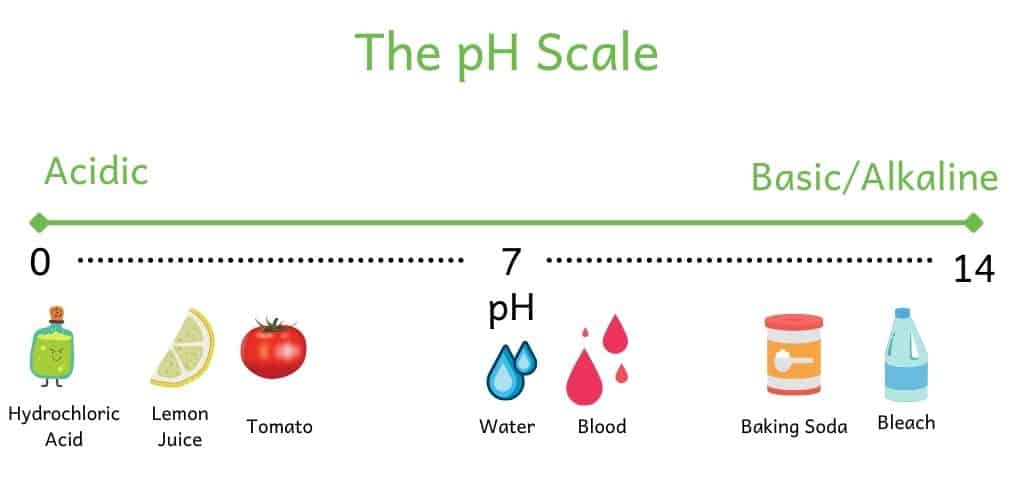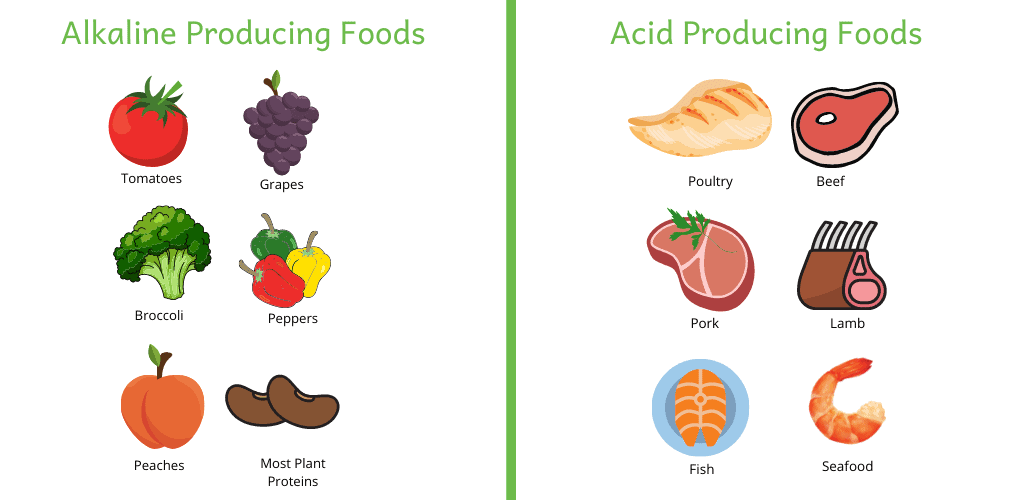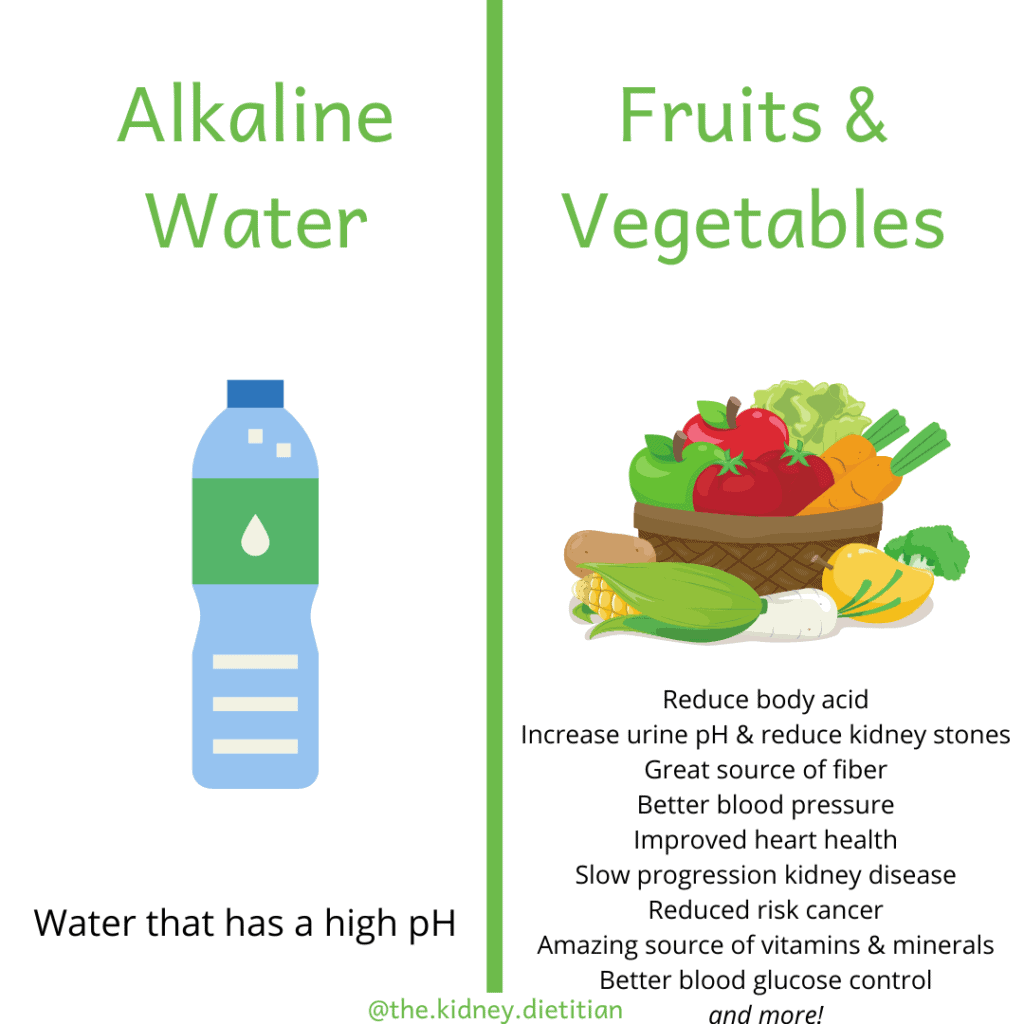In 2020, alkaline water was estimated to make $46 million in revenue, a 20% increase from 2019! (1) This is no surprise, as alkaline water carries many (largely false) health claims ranging from improving digestion, reducing cancer risk, anti-aging properties, immune boosting, colon cleaning and yes, the prevention of kidney stones.
Although alkalinity does play a role in kidney stones, alkaline water likely does not change the pH of your body in the way it needs to in order to reduce kidney stones. Read on to learn more about alkalinity, alkaline water & kidney stones!

.
The Alkaline-Acidity Scale: pH
To fully understand the alkaline water & kidney stone connection, we have to take a trip back to high school chemistry class. I promise to make this as painless as possible!
Think of alkalinity and acid as a spectrum, measured by the pH scale that runs from 0 to 14. The more acidic a substance is, the lower the pH value. The more alkaline it is, the higher the pH.

What is Alkaline Water?
Alkaline water is just as it sounds: water that is more alkaline than “normal” drinking water. Most water has a pH of about 7, and is neutral in terms of acidity and alkalinity. Alkaline water has electrolytes added to it to alkalize it, and it has a pH higher than 7.
The exact pH of alkaline water varies drastically by brand. In general, the pH of alkaline water ranges from 8 to 10.
Alkaline Water & Body pH
Although alkaline water has a high pH itself, this does NOT necessarily mean that this alkalinity ends up in our body after digestion. Or, that alkaline water causes our urine to be more alkaline, which is most important for kidney stone prevention!
Your stomach contents have a pH of 1.5-3.5. Stomach acid will neutralize the alkalinity of alkaline water as soon as it hits your stomach. Therefore, alkaline water will likely not reduce acid levels in your blood, cells or organs.
Although alkaline water is alkaline itself, it DOES NOT necessarily reduce acid levels in your urine.
Benefits of Acid
If you drink a TON of alkaline water, it could raise your stomach pH – which can be dangerous. The acid in your stomach plays an important role in digestion and absorption of food and specific nutrients, especially vitamin B12 and protein.
Stomach acid also helps kill harmful bacteria that might be on your food. This helps keep us safe from foodborne illness.
pH & Health: Do We Need Alkaline Water?
The alkaline water industry consistently spreads a message that our bodies function better with less acid (or, more alkali), therefore acid should be feared. They use this message to sell alkaline water. This is simply not true.
Acidity and alkalinity do play an important role in health. Your body tightly regulates the pH of your blood. If your blood pH gets too high or too low, your body will not be able to function properly. In fact, if your body gets too alkaline, this could cause death.
Because pH is so important, your body has many ways to keep pH where it should be.
Kidneys: The Acid Balancing Powerhouse
Firstly, assuming you have working kidneys and lungs, your body is really good at keeping pH in the right range.
The biggest way your body keeps pH in the right range is via your urine. One of the main functions of your kidneys is to keep acid and alkaline levels where they should be. Kidneys do this by carefully getting rid of just the right amount of acid in your urine to keep your body’s pH at the right level.
Here is where kidney stones come into the picture. If you eat a diet that produces a lot of acid, this acid ends up in your urine. High urine acid levels make uric acid, cystine and calcium oxalate kidney stones more likely. However, read on to learn more about how alkaline water probably won’t lower urine acid levels.
Alkaline & Kidney Stones
Is acid even a bad thing for kidney stones in the first place? It can be!
Too much acid in your urine (or, low urine pH), can make uric acid, calcium oxalate and cystine kidney stones more likely. (2) By far, calcium oxalate kidney stones are the most common type of kidney stone. (3) Uric acid kidney stones are common as well. If you have a history of these types of kidney stones, or have a low urine pH on a 24-hour urine test, there are things you can do to make your urine more alkaline.
However, too little acid (or, a high urine pH) makes calcium phosphate stones more likely to form. (2)
How To Alkalize Your Urine
When it comes to alkalizing your urine, we need to think about what pH the metabolism of a food makes, rather than what the pH is of the food itself is. Your stomach acid neutralizes the pH of anything you eat or drink. This is the crux of why alkaline water likely doesn’t actually alkalize your urine.
Foods That Make Alkaline
Unlike alkaline water, fruits and vegetables will actually impact body pH and health. Essentially, all fruits and vegetables make alkaline during metabolism. The alkali made during this process can help neutralize acid in your body, and reduce the amount of acid your kidneys have to get rid of in your urine. (4)
The difference between the pH of a food and the metabolism of that food is an important distinction. For example, tomatoes are acidic themselves. However, the metabolism of tomatoes makes alkali. So, tomatoes actually have an alkaline effect on your body, even though they are acidic themselves.
Essentially, the more fruits and veggies you eat, the more alkaline your urine will be! In many cases, especially for uric acid kidney stones, more alkaline urine is a good thing!
On the flip side, protein foods, especially animal flesh such as meat, poultry, fish and seafood, produce acid. Diets that are high in protein tend to increase urine acid levels. (4)

This concept plays out in research. We know that people who eat more fruits and vegetables tend to have a much lower risk of kidney stones. (5) (6) (7) This is likely at least partially due to the beneficial impact of fruits and vegetables on urine acid.
Does Alkaline Water Make Alkali?
How does alkaline water fit into this? Chances are, even though alkaline water is alkaline itself, the metabolism of it will not produce alkali. Therefore, it will have no benefits for kidney stones, above the benefit of drinking regular water.
For all brands of alkaline water I could find, there was not enough information about the amount and type of electrolytes in them to determine if they would make alkali during metabolism. As we know, the pH of an actual liquid (or food!) itself says nothing about it’s ability to produce alkali during metabolism.
If you need to alkalize your urine for kidney stones, you are much better off focusing on eating plenty of fruits and vegetables and eating the right amount of protein, rather than drinking alkaline water.
Medications
Medicine is another way to alkalize your urine. Potassium citrate and sodium bicarbonate are two common medications prescribed to reduce urine acid levels, and help prevent the most common types of kidney stones.
Potassium citrate may also be prescribed to increase urine citrate levels. Citrate makes it harder for calcium kidney stones to form.
Ask your doctor before taking any medications.
Alkalizing Water Enhancers
There are a few beverages that are specially formulated to produce alkaline. Unlike most alkaline waters on the market, we know exactly what is in these drinks, and that they have the right combination of nutrients to make alkali after your drink them.
These drinks are also a great source of citrate, which can help prevent calcium kidney stones. (8)
Two common beverages recommended for kidney stones are:
These drinks are not right for everyone. In some cases, these drinks could be harmful. So, make sure to ask your doctor or Registered Dietitian if these drinks are right for you!
The Best Water for Kidney Stones
No matter what kind of kidney stone you have, drinking enough water is one of the most important things you can do to prevent them.
The American Urological Association recommends drinking enough fluid to make 2 1/2 liters of urine each day. For most people, this means drinking about 3 liters of fluid. (9)
But, what kind of water is best for kidney stones?
Good Ol’ Tap Water & Kidney Stones
Truly, for most people, plain old tap water is the best water for kidney stones. It is cheap and accessible, making it more likely that you will be able to drink enough!
In rare cases, hard water may be a problem.
Bottled Water & Kidney Stones
Bottled water certainly isn’t necessary for people with kidney stones. But, if you prefer the taste of bottled water and it will help you drink more, then bottled water is a good choice for you!
Mineral Water & Kidney Stones
Mineral water can contain large amounts of calcium. Although eating enough calcium is important for calcium oxalate kidney stone prevention, it is ideal that calcium come from food.
One or two mineral waters a day will likely not cause issues. However, because people with kidney stones need to drink so much water, that extra calcium could add up to harmful amounts.
Ask your dietitian what is best for you!
Alkaline Water & Kidney Stones
Since we don’t know if alkaline water will actually reduce urine acid levels, I cannot recommend alkaline water above plain tap water.
There is also no research to show that alkaline water is good for kidney stones.
In addition, alkaline water can be very expensive. I’d save your money and use it to buy fresh fruits and vegetables!

Other Fluids For Kidney Stones
To prevent kidney stones, most of your fluid should be water. However, water can get boring!
Here are some other good fluid options to mix it up.
- Unsweetened sparkling water (like La Croix*, Polar* or Bubly*)
- Milk (calcium rich foods can help prevent oxalate kidney stones)
- Citrus Flavored Diet Soda
- Sugar-free lemonade*
- Tea & Coffee (Yes, tea! Studies show a reduced risk of kidney stones in tea drinkers) (4)
Be careful to limit drinks with lots of sugar in them like juice, punch, regular soda, energy drinks, or sweet tea. Sugary drinks can increase the risk of kidney stones.





